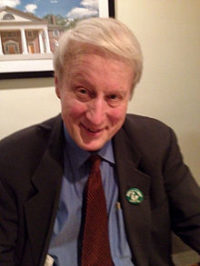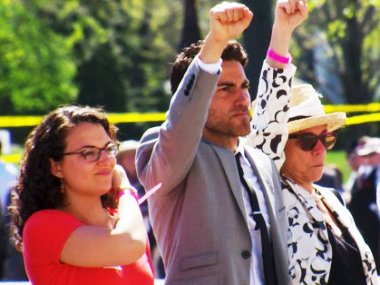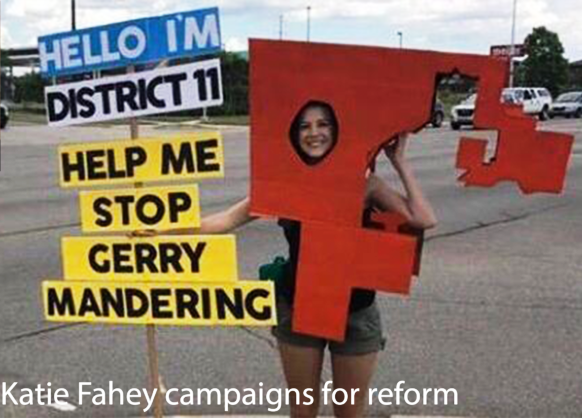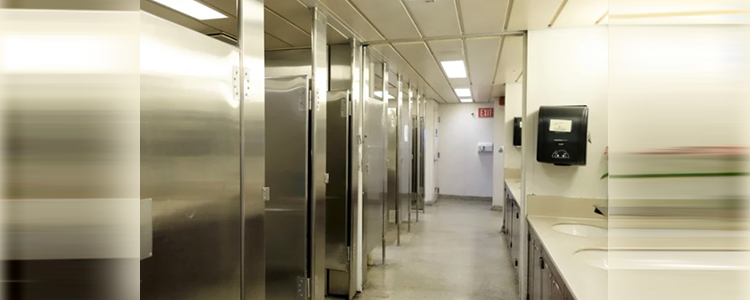Tuesday, August 28 at 5 p.m. at Emmanuel Parish Hall
— by Margie Doyle —
Veteran journalist Hedrick Smith will discuss “Taking Back Our Democracy; The People vs. the Politicians” and offer concrete examples and encouragement for fixing the polarization and bottlenecks in government next Tuesday at Emmanuel Parish Hall in Eastsound. He maintains that citizen movements, person-to-person and state-by-state, are winning back our democracy.
The crucial element to reclaiming government of the PEOPLE, by the PEOPLE and for the PEOPLE (Abraham Lincoln’s emphasis) is to fix the system of gerrymandering that has allowed political parties to “rig” the electorate. This is a story that Smith claims the mainstream media of all perspectives is missing. Why? Because the media and the voters are both seduced by reports of personalities rather than reports about issues.
“Gerrymandering is the gateway to dealing with the issues,” Smith says unequivocably.
“Gerrymandering is the process of manipulating political district boundaries to benefit a particular political party. Elected officials redraw district lines every decade, and the party in power can use the opportunity to move boundaries to minimize opponents’ votes and increase their odds of staying in power.
“Gerrymandering often results in oddly shaped districts, where cities, townships and even neighborhoods are split and sliced apart. The practice can be used to limit the power of particular demographics of people, typically minority populations as categorized by by race, socioeconomic class or religion.” from www.countmivote.org
The locale of that gateway is at the grassroots — person-by-person, state-by-state — says Smith. Since the Citizens United decision in 2010, political campaigns have donated huge amounts of cash from super PACS — independent political action committees that bundle donations from companies, individuals and unions. But in response, some voters have been motivated to overturn the 5-4 decision that corporations have the free-speech right to spend unlimited amounts of money advocating for a candidate or cause.
The grass-roots movement for reform reflects “a very bottom-up mood” that has taken hold, Smith notes, “with people power on the uptick and political/government reform slowly gathering speed” while the media is focused almost exclusively on Washington D.C.
Smith is heartened by the movements to address campaign financing and gerrymandering on state ballots this November in Colorado, Ohio, Michigan, Utah, and Missouri. Similar movements capture the issue, the timing, and the narrative of the story, and how it’s placed before people to counter decisions such as Citizens United and resultant policies. Once this issue has gotten the public’s attention, Smith asks “What are we going to do about it?”
It’s voters, not politicians, such as those involved in CountMIvote, and the League of Women Voters who in Florida in 2010 garnered 62.9% of vote for a constitutional amendment opposing gerrymandering. Smith points to the state of Pennsylvania where the courts redrew the lines in 2011.
Electoral redistricting is an issue whose time has come, says Smith. “People understand that money in politics is corrupting.” The majority of the voting public believes that politicians don’t listen; elections are rigged; special interests dominate the work of government.
“The system is broken, so whatever side you line up on is doomed.” Mainstream media — television, journalism and radio — are not doing a good job of getting media out, Smith says. Instead it’s covering Trump, opposition to Trump and government ineptitude rather than reports on efforts and progress to fix the system by addressing redistricting and passing legislation to uphold democratic values.
“This story is the missing story,” Smith says. The media and the public is focused on personalities such as Trump and his cabinet, Congressional leaders and media moguls rather than issues such as gun violence, immigration, defense spending and/or the integrity of voting systems.
“After you get peoples’ attention, how do you fix it? Where’s the bottleneck?
“Stacked elections with the input of money and gerrymandering. Fixing the system is the gateway to getting to where you want to go on the issues. People have to come to understand if they want to get through the ‘wicket’ on issues, they have to fix the playing field.”
Through people-to-people and state-by-state progress, Smith says, the country can solve the problems of the corruption of money and legislative redistricting and make a difference in national elections within 10 years.
He cites legislation in Connecticut addressing the polarized discussion on school slaughter vs. the right to bear arms “At some point it has to dawn on you the issue can’t move. It’s not as if you change the person and you’ve fixed the issue — we’re past that point.”
Connecticut is one state that did just that by passing gun-control legislation after public financing of political campaigns was enacted. Public financing, limited to $100 per person, improves the electoral process by:
- Allowing candidates to compete without reliance on special interest money;
- Allowing statewide officers and legislators the ability to make decisions free of the influence of, or the appearance that they have been influenced by, donations from special interests;
- Restoring public confidence in the electoral and legislative processes;
- Increasing meaningful citizen participation and
- Providing the public with useful and timely disclosure of campaign finances
(from https://www.blueprintsfordemocracy.org/model-public-funding-system/)
The result, Smith says, is less lobby power, and the “People who could run have changed– more Blacks, Latinos and middle class Whites. It changes the legislature, changes the leadership, and changes the agenda. The leadership focuses on the issues, rather than raising money.”
North Carolina is also addressing redistricting, Smith reports from his website reclaimtheamericandream.org : “In North Carolina, an anti-gerrymander lawsuit brought by the League of Women Voters, NAACP and the Southern Coalition for Social Justice is back before a three-judge federal district court. In earlier decisions, the three-judge panel ruled in favor of the voters’ challenge to the Republican gerrymander in that state. The U.S. Supreme Court ordered the case to be reviewed at the district level, and now that case seems back on a fast track toward the nation’s highest court.”
States change their laws through such citizen movements as the one started by Katie Fahey, a 28-year old student in Michigan, whose Facebook post elicited 5,000 responses and started the movement that places redistricting on the state ballot this November.
In Washington state,Cindy Black shepherded the initiative process that got I-735 on the 2016 ballot which passed by 63 percent of the vote. The measure calls for Washington state’s congressional delegation to propose a United States constitutional amendment that ultimately would take away the impact of the Citizen’s United.
Black is an Army veteran, a counselor and an art supply vendors. Her campaign for I-735 passed because of “talking neighbor to neighbor, this is what we’ve got to do,” says Smith.
He faults mainstream journalism for not dogging this dry-but-critical story. He puts his faith in the grassroots — people who tackle the issue locally and impact state legislation to represent voters more fairly. Smith delivers this message through a new one-hour documentary for MSNBC, “Citizen Rebellions at the Grass Roots” and through his discussion at Emmanuel Parish Hall on Tuesday, Aug. 28 at 5 p.m.
Come find out what encourages one of America’s most respected veteran reporters, and what you can do. Tickets at Darvill’s – $10.
Hedrick Smith was a member of the New York Times team that produced the Pentagon Papers series, which won a Pulitzer Prize in 1972.. He is the author of The Russians (1976), and The New Russians (1990), The Power Game (1996) and Who Stole the American Dream? (2012). He is also a PBS Frontline producer. For more information, go to reclaimtheamericandream.org
**If you are reading theOrcasonian for free, thank your fellow islanders. If you would like to support theOrcasonian CLICK HERE to set your modestly-priced, voluntary subscription. Otherwise, no worries; we’re happy to share with you.**











Amen. Long overdue. This has to be done so the people can choose who represents them. Now it’s only the money that talks for us, like it or not.